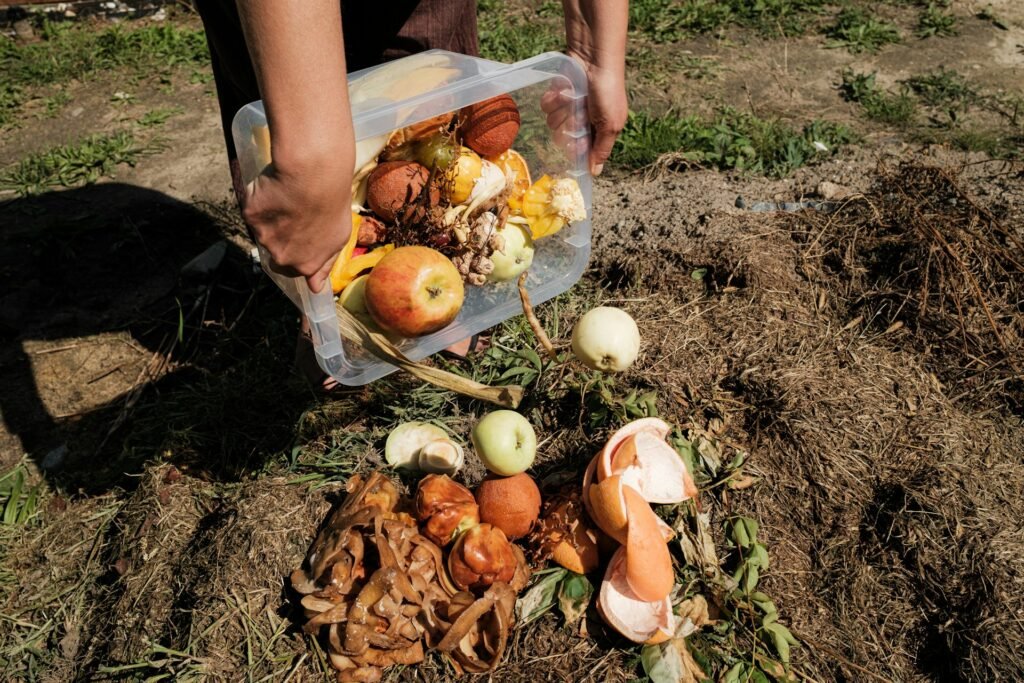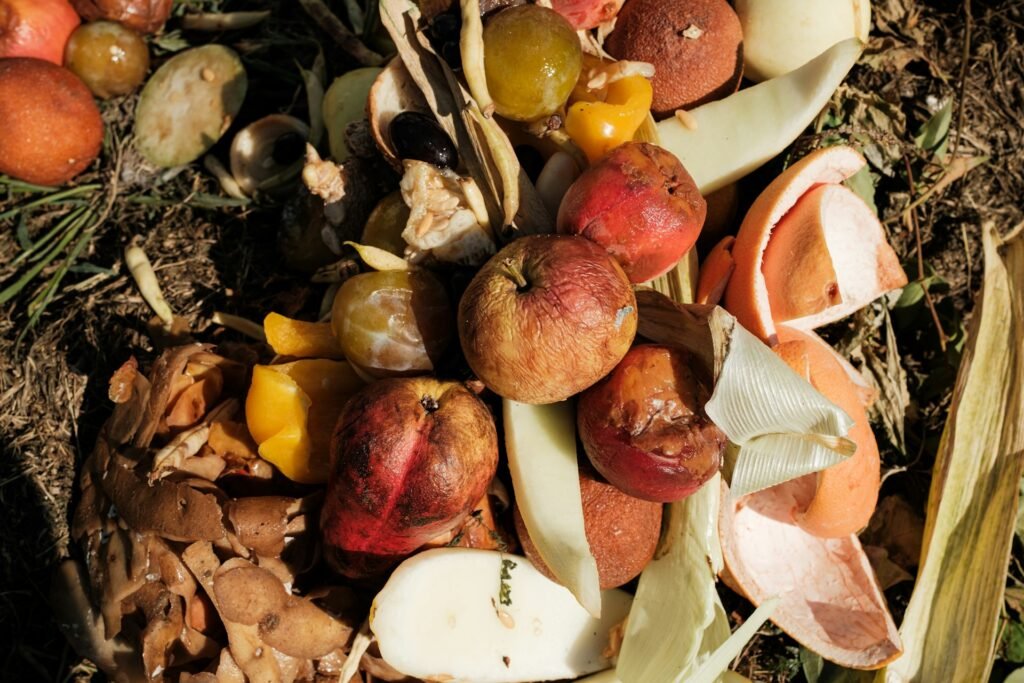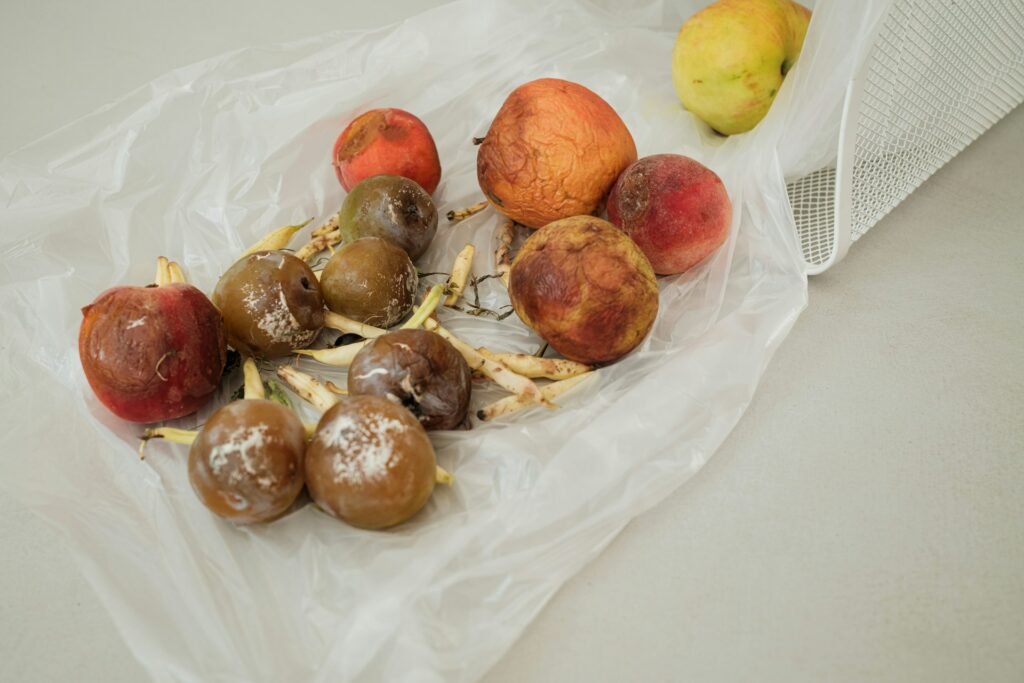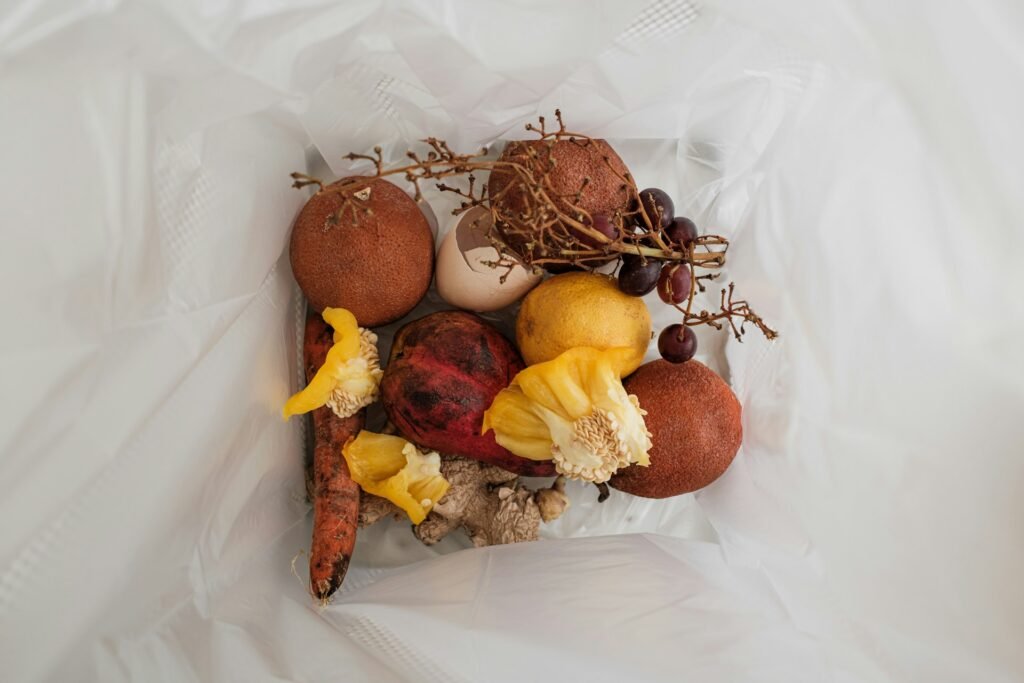Organic compost is a rich, soil-like substance resulting from the natural decomposition of organic matter. An essential component for gardeners and farmers, it’s created from decomposed green waste and other organic materials. This natural process recycles nutrients back into the earth, making them available for new plant growth. The use of organic compost is pivotal in sustainable agriculture and home gardening as it enhances soil structure, provides essential nutrients, and supports vibrant ecosystems.
Practical uses of organic compost include soil amendment for gardens and landscapes, as a natural fertilizer to boost plant health, and as a means to reduce the amount of green waste sent to landfills. Its ability to improve soil fertility and structure makes it an invaluable asset for producing healthy crops and ornamental plants, ultimately contributing to a more sustainable and productive environment.
Understanding Organic Compost
Organic compost is composed of decomposed green waste, which includes leaves, twigs, and grass clippings from gardens and landscapes. When these materials break down, they transform into a nutrient-dense medium that’s ideal for plant growth. The composting process is facilitated by microorganisms and requires a balance of carbon-rich and nitrogen-rich materials to be effective.
Engaging in the composting process allows individuals to contribute to a closed-loop system that promotes resource efficiency. By understanding the composition and benefits of organic compost, gardeners can make informed decisions about how they manage their green waste and support the health of their garden ecosystems.
The Role of Organic Matter in Compost
Green waste is the cornerstone of organic compost, serving as a primary source of organic matter that energizes the composting process. As it decomposes, this green waste releases a wealth of nutrients that were once part of living plants. The presence of organic matter in compost is crucial, as it acts as a sponge for moisture, a bank for nutrients, and a habitat for beneficial microorganisms.
The inclusion of diverse organic matter, such as green waste, is vital for creating a balanced compost with a rich array of nutrients. This variety ensures that compost can provide comprehensive soil enhancement, supporting a wide range of plants and contributing to overall soil health. Through the judicious addition of green waste, one can cultivate a robust organic compost that serves as the bedrock for thriving gardens.
Organic Compost vs Inorganic Fertilizers
Unlike inorganic fertilizers, organic compost is derived from natural plant materials and waste materials, including green waste, which fosters soil health and supports beneficial microbes. These microorganisms play a critical role in breaking down organic matter and releasing plant nutrients in the process. Organic compost enriches the soil with nutrients like nitrogen and elements essential for the growth of fruits and vegetables.
In contrast, inorganic fertilizers may offer immediate nutrients for plants but cannot improve soil organic content or support beneficial organisms. Organic compost also aids moisture retention, whereas synthetic options can contribute to soil compaction and erosion. Moreover, organic compost is unlikely to attract rodents or contain pet waste, which are concerns with some inorganic products. For gardens adhering to organic certification standards, such as those involving organic livestock, organic compost is the preferred choice to maintain the integrity of the ecosystem.

Crafting Your Organic Compost at Home
Creating organic compost at home is a rewarding process that converts kitchen scraps and yard waste into valuable soil amendments. The key to successful organic composting is balancing carbon and nitrogen, the fundamental elements that feed the microorganisms responsible for decomposition. This balance is often referred to as the ratio of browns to greens, with browns providing carbon and greens supplying nitrogen.
By carefully selecting the right ingredients for your compost pile, such as food scraps, wood chips, fresh grass clippings, and chicken manure, you can craft a nutrient-rich compost. These materials offer a diverse range of carbon-to-nitrogen ratios, ensuring a well-rounded and effective composting process. With patience and proper management, anyone can transform their kitchen scraps and yard debris into organic compost that benefits their garden and the environment.
Selecting the Right Ingredients for Your Compost Pile
For a thriving compost pile, it’s essential to mix various ingredients that provide both carbon and nitrogen. Brown materials like wood chips contribute carbon, while green materials such as food scraps and fresh grass clippings offer nitrogen. Chicken manure is particularly rich in nitrogen, accelerating the composting process. Achieving the right carbon-to-nitrogen ratio is critical for efficient decomposition and results in high-quality organic compost.
The Brown and Green Balance: Carbon and Nitrogen Content
Managing the balance of brown and green materials is pivotal in composting. Browns, such as wood chips, are carbon-rich and provide the necessary energy for the microbes that break down waste. Greens, including coffee grounds and fresh grass clippings, supply nitrogen, which is vital for protein synthesis in the microbial population. A well-maintained balance ensures a healthy, odor-free composting process and yields a rich end product.
An optimal carbon-to-nitrogen ratio is about 30:1, favoring more carbonaceous brown materials over nitrogenous greens. However, this can vary based on the specific materials used. For example, coffee grounds, though considered green, have a lower nitrogen content than fresh grass clippings and thus can be used more liberally. Monitoring and adjusting the brown and green input as the compost matures is key to maintaining a healthy composting ecosystem.
The Many Benefits of Organic Compost
Organic compost offers numerous benefits, significantly enhancing soil health. It increases soil biodiversity by introducing beneficial organisms such as worms, which aerate the earth and break down organic material. Compost also helps soil retain moisture, reducing the need for frequent watering. Elements like calcium found in compost contribute to balancing soil pH, creating a more hospitable environment for a variety of plants.
Moreover, using organic compost can mitigate the impacts of climate change by reducing greenhouse gas emissions associated with synthetic fertilizers and waste disposal. It also strengthens the soil’s structure, making it more resistant to erosion and promoting healthier plant growth. By providing essential nutrients that plants require, organic compost serves as an invaluable resource for gardeners aiming to cultivate robust, disease-resistant plants.
Soil Health and Fertility Enhancement
Organic compost is a boon to soil health, improving texture and fertility with each application. Its rich organic matter supports a thriving community of soil organisms, which in turn, facilitate the breakdown of nutrients for easy plant absorption. Regular incorporation of compost into garden beds rejuvenates the soil, promoting vigorous plant growth and higher yields.
By enhancing the soil’s natural fertility, compost reduces the need for chemical fertilizers, which can harm the environment. Healthier soils also mean stronger plants, more capable of withstanding stress, and less reliance on pesticides. This cycle of enrichment fortifies the garden ecosystem, making it a self-sustaining haven for a diverse range of flora and fauna.
Mitigating Garden Pests and Diseases
Organic compost plays a critical role in suppressing plant diseases and deterring pests. By bolstering plant health and strengthening their immune systems, compost helps plants resist infections and infestations. The diverse microbial life within compost competes with disease-causing organisms, often preventing them from taking hold in the garden.
Healthier plants with robust root systems are less susceptible to the stresses that can attract pests. The use of compost can reduce the need for chemical pesticides, which can be harmful to beneficial insects and the environment. Embracing organic compost is a step towards a more integrated, natural approach to managing garden health.
Water Conservation through Improved Soil Structure
Organic compost contributes to water conservation by enhancing soil structure, which improves its ability to store water. The organic matter within compost acts like a sponge, retaining moisture that plants can access during dry periods. This increased water-holding capacity reduces the frequency of watering needed, conserving a precious resource.
The improved soil structure also promotes better root growth, allowing plants to more effectively seek out and utilize water and nutrients. This resilience is particularly important in areas subject to drought or with limited water resources. By using organic compost, gardeners can maintain lush, healthy gardens while practicing responsible water stewardship.
Guide to Using Organic Compost Effectively
Using organic compost effectively in agronomic and horticultural endeavors enhances plant growth and health. By incorporating compost into the soil, gardeners can avoid unpleasant odors and create a nutrient-rich environment for plants to thrive. Organic gardening with compost ensures a sustainable and eco-friendly approach to nurturing plants and maintaining soil vitality.
Incorporating Compost as a Soil Amendment
Applying a layer of compost to garden beds is a simple yet powerful way to help plants grow. This organic matter slowly releases nutrients into the soil, providing a steady supply of food for plants. Additionally, compost improves soil structure, increasing its ability to hold both water and nutrients, which are essential for plant health.
Optimal Times to Enrich Soil With Compost
The best times to enrich soil with compost are in the spring before planting and in the fall after harvest. Spring applications give seeds and transplants a nutrient-rich environment to establish themselves. In the fall, adding compost helps replenish the soil after a growing season and prepares it for the next year’s plantings, ensuring ongoing soil health and fertility.
Creating and Using Compost Tea for Plant Nutrition
Compost tea is a nutrient-rich liquid solution crafted by steeping finished compost in water, creating a brew teeming with beneficial microorganisms. When applied to soil, the tea introduces a complex community of living organisms that symbiotically interact with plant roots, enhancing nutrient uptake and promoting robust plant health. This liquid form of compost is an effective way to provide plants with a gentle, consistent dose of organic nutrition, without the risk of burning delicate root systems that solid compost applications might incur.
Mulching with Organic Compost for Moisture Retention
Organic compost serves as an excellent mulch that retains moisture, reducing the need for frequent watering and helping to maintain consistent soil hydration levels.
How Mulch Protects Against Temperature Extremes
Mulching with organic compost offers a protective barrier for the soil, insulating it against the harsh effects of temperature fluctuations. This is particularly beneficial for young plants, trees, and shrubs, which may be vulnerable to extreme heat or cold. A layer of compost mulch retains moisture and helps to maintain a more stable soil temperature, mitigating the stress on plant root systems and supporting overall plant health. It is important to evenly wet the compost before applying it as mulch to maximize its temperature-regulating properties.

Advanced Composting Techniques
For those looking to elevate their organic composting, exploring advanced techniques can lead to richer, more effective compost. These methods often involve specific equipment or practices that enhance the natural decomposition process, producing compost that can achieve remarkable results in the garden.
Home-Scale Vermicomposting: Utilizing Worms for Richer Compost
Vermicomposting is a method that harnesses the natural digestive processes of worms to break down food scraps more efficiently, producing a nutrient-rich compost known as worm castings. By creating a hospitable environment for worms in a compost bin, organic matter is recycled into a powerful soil amendment that can significantly boost plant growth and soil health.
Overcoming Small Space Challenges: Composting in Apartments
Even in limited spaces, composting is achievable with the right approach and tools.
Indoor composting requires careful attention to factors such as space, odor control, and pest management. A well-designed compost bin can help maintain these balances while facilitating the breakdown of organic matter. By selecting the appropriate bin and managing scraps and other inputs, urban dwellers can participate in organic composting, transforming kitchen waste into valuable compost for houseplants or community gardens.
Troubleshooting Common Compost Problems
Composting, while beneficial, can sometimes present challenges that require troubleshooting. Common issues such as odors, slow decomposition, or pest infestations can often be addressed with simple adjustments to the composting process.
Managing Odor Issues in Compost Bins
Unpleasant smells emanating from a compost bin are often due to an imbalance in the composting materials, particularly an excess of food scraps. To mitigate this, one should adjust the ratio of greens and browns, ensuring there is enough carbon-rich material to absorb excess moisture and suppress odors. Regular aeration and avoiding overly wet conditions can also help maintain a healthy, odor-free compost bin.
Strategies to Accelerate the Composting Process
Speeding up the composting phase can be as simple as increasing aeration and ensuring optimal moisture levels.
Aeration plays a crucial role in the composting process, as it supplies the oxygen needed by microorganisms to break down organic matter. Proper moisture balance is equally important; too little water slows decomposition, while too much can create anaerobic conditions and unpleasant odors. Turning the compost regularly and monitoring its moisture content are key practices for maintaining an efficient composting process.
Ancient Practices to Modern Innovations in Compost Making
Since ancient times, civilizations have recognized the importance of returning nutrients to the soil. Early composting practices laid the groundwork for today’s innovative techniques, which optimize the process through science and technology. This evolution from rudimentary to refined methods underscores our growing understanding of ecological balance and soil health.
A Greener Tomorrow With Organic Compost
A greener future is within our grasp, with organic compost playing a pivotal role. By reintroducing decomposed organic matter back into the soil, we mimic nature’s recycling system. This closes the loop on organic waste, mitigating our impact on the planet and leading the way toward a more sustainable and resilient tomorrow.
The Environmental Impacts of Embracing Organic Composting
Embracing organic composting generates profound environmental impacts, from improving soil structure to reducing reliance on chemical fertilizers.
When food waste and organic waste are diverted from landfills to compost bins, the benefits are multifaceted. In the United States, composting significantly reduces methane emissions, a potent greenhouse gas released as organic matter decomposes anaerobically in landfills. Moreover, composting transforms waste into a resource, enriching soils and curbing the need for landfill expansion.

Final Reflections on the World of Organic Composting
As we reflect on the expansive world of organic composting, it’s clear that composting improves soil health and, by extension, the plants and ecosystems that depend on it. Through a simple act of recycling organic matter, we tap into a cycle of life that sustains and nourishes our environment, laying the foundation for a more fertile and abundant earth.
Embracing Organic Compost for Sustainable Living and Gardening
Embracing organic compost to enrich the soil is at the heart of sustainable living. Incorporated into the soil, compost acts as a slow-release fertilizer, providing essential nutrients from decayed organic matter, such as animal manure and woody debris. Fungal and microbial agents break down this material, releasing nutrients and organic matter that plants crave. Compost brings life to garden soil, creating an ideal compost that is crumbly and smooth, reminiscent of a forest on a rainy day. This natural process of waste compost enhances soil fertility without the need for synthetic additives, and it’s endorsed by organizations like the Composting Council for its myriad benefits. By fostering a diverse, nutrient-rich environment, composting supports a sustainable future for both our gardens and the world at large.


